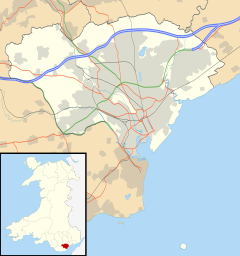Llanrumney Hall
| Llanrumney Hall | |
|---|---|

Llanrumney Hall in 2014
|
|
|
Llanrumney Hall within the present day border of Cardiff
|
|
| Alternative names | Neuadd Llanrhymni |
| General information | |
| Type | Country house; former public house |
| Address | Ball Road, Llanrumney |
| Town or city | Cardiff |
| Country | Wales |
| Coordinates | 51°31′19.7″N 3°7′47.2″W / 51.522139°N 3.129778°WCoordinates: 51°31′19.7″N 3°7′47.2″W / 51.522139°N 3.129778°W |
| Construction started | 1450 |
| Owner | Cardiff Council |
Llanrumney Hall (Welsh: Neuadd Llanrhymni) is Grade II* listed building in the Cardiff suburb of Llanrumney in Wales. The Elizabethan mansion was built in 1450, rebuilt in 1852 and refurbished around 1900. Throughout its history it has been a stately home and more recently a pub. The Hall has now fallen into disrepair, although a plan has been drawn up to convert the building into an education and sporting facility.
The area of Llanrumney was given to the monks at Keynsham Abbey, in Somerset, England, after the Norman conquest of England. They built a small chapel on the site of what is now Llanrumney Hall.
The Elizabethan Llanrumney Hall and its 700 acres (280 ha) estate was originally built in 1450 and is thought that it passed to the Kemys family of Cefn Mably in the mid-1500s after the dissolution of the Monasteries by Henry VIII. William Kemys left the estate to his daughter, who was married to Thomas Morgan. Llanrumney Hall has since been occupied by five generations of the Morgan family, whose ancestral home was Tredegar House in Newport. Morgan Morgan was the last in the male line and the hall and estate passed by marriage onto the Lewis family in 1726. In the mid 19th century the Hall was occupied by Edward Augustus Freeman, the Regius Professor of History at the University of Oxford. It was purchased by Charles Crofts Williams of Roath Court in 1859, who was the hall's last recorded Lord of the Manor. Around 1900 the hall was refurbished. His family lived at the hall until the development of the surrounding housing estate, when it was occupied by Llewellyn Williams.
...
Wikipedia

